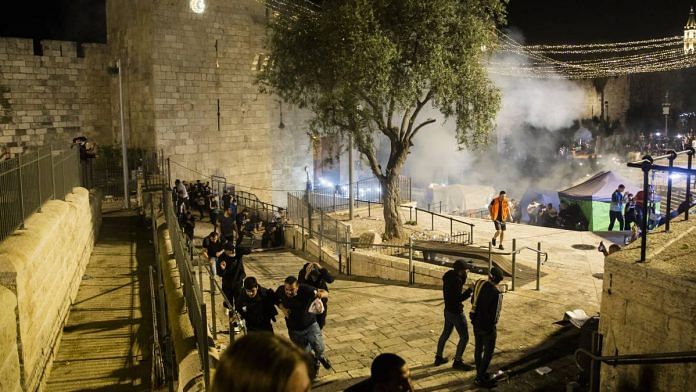New Delhi: Israel bombarded Gaza with air strikes Friday following rocket fire from the Hamas-run region, intensifying a renewed conflict that has now claimed 127 lives.
Unlike in the past, social media, especially the youth-centric platform TikTok, is playing an important role in the current tensions.
The recent escalation of tensions between Israel and Palestine began last month at Jerusalem’s Damascus Gate when Israeli Police prevented Palestinians from congregating after evening prayers during Ramzan.
Israelis have been angered by a recent spate of videos on TikTok, a video-sharing app run by Chinese firm Byte Dance, showing Palestinians filming assaults on unsuspecting Jews.
Steven Burg, New Jersey-based CEO of Orthodox Jewish educational organisation Aish HaTora, terms them “TikTok attacks” where the victims were identifiably Orthodox Jews.
TikTok video ‘sparks’ march by fringe Israeli group
On 28 April, three Palestinian vehicles in the West Bank village of Beit Iksa were set on fire, along with graffiti that read: ‘Jews, let’s win’ and ‘TikTok’.
The incident was suspected to be revenge for recent TikTok posts showing Arab youth attacking Jews, according to Israeli channel i24News.
Earlier, on 20 April, Israeli Police arrested two Palestinian teenagers for filming themselves slapping a Jewish man on a train and sharing it on TikTok. The incident drew criticism from top government officials, including Interior Minister Arye Dery who called it “shocking and antisemitic”.
In an op-ed for The New York Times, renowned author and journalist Thomas Friedman said the video was “a way of inspiring copycat attacks” among other Palestinians and that it prompted ultra-nationalist Jewish group Lehava to lead a march to Damascus Gate — where large numbers of Palestinians had gathered to break their fast. Calls to lynch Palestinians were revealed in Lehava’s leaked Whatsapp messages. The march was followed by one of the worst fighting in East Jerusalem, on 22 April, that left over 100 injured.
A report by the Atlantic Council Thursday remarked that the 20 April TikTok video “foreshadowed new heights of defiance in resisting Israel’s authority”.
Earlier on 16 April, a 21-year-old TikTok user from Beit Hanina was arrested for uploading a video of him slapping two Jewish teenage boys. It was captioned: “You will continue to delete and I will continue to upload. It’s either the Palestinian people or you.”
In the video, the TikToker can be seen knocking off the glasses of one of the boys.
A day after the assault, the father of one of the boys told Kan public broadcaster that his 14-year-old son felt “upset, humiliated and afraid” by the incident.
When asked what actions have been taken to regulate content, a TikTok spokesperson told ThePrint Saturday via email, “Our teams have been working swiftly to remove misinformation, attempts to incite violence, and other content that violates our Community Guidelines, and will continue to do so.”
On 6 March and miles away, Abdullah Mulla, a Yemeni content creator, made headlines after he went to a Jewish-owned kosher store in Detroit, Michigan, and asked customers to read out a picture on his phone of the words “Free Palestine”. He recorded their reactions and shared the clip on TikTok with his 2.91 lakh followers.
A report in the Jerusalem Post noted that Mulla’s video angered Jewish organisations.
Also read: What is Hamas, how it rose to power & its role in Israel-Palestine conflict
Censorship of content
TikTok has received flak from both the Israeli and Palestinian sides on hate speech and censorship. Along with Twitter and Facebook, it has been blamed for amplifying misinformation about the recent violence.
According to University of Haifa Professor Gabriel Weimann, the platform has also failed in censoring hate speech and inappropriate content. “I don’t want to sound like the Chinese should be blamed, but a Chinese company is certainly not as aware of democratic values or attempts at regulation,” he told the Jerusalem Post.
In January this year, Quds News Network, one of the leading news agencies in Palestine, was removed from TikTok without notice. The account had more than 50,000 followers and 7 million views.
Hamzah al Shobaki, the platform’s TikTok account manager, said the account was deleted after it shared 1,200 posts related to recent Arab normalisation deals and Israeli occupation. In response to the removal, QNN Director Ahmad Jarrar accused TikTok of being in “partnership with the occupation”.
Responding to Jarrar’s accusation, a TikTok spokesperson told ThePrint that “while identification of a Community Guidelines violation may occasionally lead to an incorrect action on content or an account, we allow in-app appeals and reassess our actions accordingly. This was the case for [the removal of] the account in question, which has been since reinstated.”
(Edited by Arun Prashanth)
Also read: Al-Aqsa violence: Why Palestinians & Jews have often clashed at this holy site in Jerusalem



